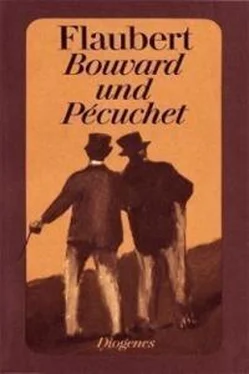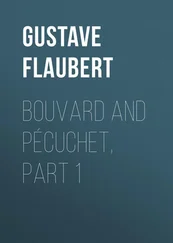M. de Faverges, who had estates in Eure, was declared a member of the Legislative Assembly, and his re–election for the general council of Calvados was certain beforehand.
He thought proper to invite the leading personages in the district to a luncheon.
The vestibule in which three servants were waiting to take their overcoats, the billiard–room and the pair of drawing–rooms, the plants in china vases, the bronzes on the mantel–shelves, the gold wands on the panelled walls, the heavy curtains, the wide armchairs—this display of luxury struck them at once as a mark of courtesy towards them; and, when they entered the dining–room, at the sight of the table laden with meats in silver dishes, together with the row of glasses before each plate, the side–dishes here and there, and a salmon in the middle, every face brightened up.
The party numbered seventeen, including two sturdy agriculturists, the sub–prefect of Bayeux and one person from Cherbourg. M. de Faverges begged his guests to excuse the countess, who was absent owing to a headache; and, after some commendations of the pears and grapes, which filled four baskets at the corners, he asked about the great news—the project of a descent on England by Changarnier.
Heurtaux desired it as a soldier, the curé through hatred of the Protestants, and Foureau in the interests of commerce.
"You are giving expression," said Pécuchet, "to the sentiments of the Middle Ages."
"The Middle Ages had their good side," returned Marescot. "For instance, our cathedrals."
"However, sir, the abuses―"
"No matter—the Revolution would not have come."
"Ha! the Revolution—there's the misfortune," said the ecclesiastic with a sigh.
"But everyone contributed towards it, and (excuse me, Monsieur le Comte) the nobles themselves by their alliance with the philosophers."
"What is it you want? Louis XVIII. legalised spoliation. Since that time the parliamentary system is sapping the foundations."
A joint of roast beef made its appearance, and for some minutes nothing was heard save the sounds made by forks and moving jaws, and by the servants crossing the floor with the two words on their lips, which they repeated continually:
"Madeira! Sauterne!"
The conversation was resumed by the gentleman from Cherbourg:
"How were they to stop on the slope of an abyss?"
"Amongst the Athenians," said Marescot—"amongst the Athenians, towards whom we bear certain resemblances, Solon checkmated the democrats by raising the electoral census."
"It would be better," said Hurel, "to suppress the Chamber: every disorder comes from Paris."
"Let us decentralise," said the notary.
"On a large scale," added the count.
In Foureau's opinion, the communal authorities should have absolute control, even to the extent of prohibiting travellers from using their roads, if they thought fit.
And whilst the dishes followed one another—fowl with gravy, lobsters, mushrooms, salads, roast larks—many topics were handled: the best system of taxation, the advantages of the large system of land cultivation, the abolition of the death penalty. The sub–prefect did not forget to cite that charming witticism of a clever man: "Let Messieurs the Assassins begin!"
Bouvard was astonished at the contrast between the surroundings and the remarks that reached his ears; for one would think that the language used should always harmonise with the environment, and that lofty ceilings should be made for great thoughts. Nevertheless, he was flushed at dessert, and saw the fruit–dishes as if through a fog. Bordeaux, Burgundy, and Malaga were amongst the wines sent round. M. de Faverges, who knew the people he had to deal with, made the champagne flow. The guests, touching glasses, drank to his success at the election; and more than three hours elapsed before they passed out into the smoking–room, where coffee was served.
A caricature from Charivari was trailing on the floor between some copies of the Univers . It represented a citizen the skirts of whose frock–coat allowed a tail to be seen with an eye at the end of it. Marescot explained it amid much laughter.
They swallowed their liqueurs, and the ashes of their cigars fell on the paddings of the furniture.
The abbé, desirous to convince Girbal, began an attack on Voltaire. Coulon fell asleep. M. de Faverges avowed his devotion to Chambord.
"The bees furnish an argument for monarchy."
"But the ants for the Republic." However, the doctor adhered to it no longer.
"You are right," said the sub–prefect; "the form of government matters little."
"With liberty," suggested Pécuchet.
"An honest man has no need of it," replied Foureau. "I make no speeches, for my part. I am not a journalist. And I tell you that France requires to be governed with a rod of iron."
All called for a deliverer. As they were going out, Bouvard and Pécuchet heard M. de Faverges saying to the Abbé Jeufroy:
"We must re–establish obedience. Authority perishes if it be made the subject of discussion. The Divine Right—there is nothing but that!"
"Exactly, Monsieur le Comte."
The pale rays of an October sun were lengthening out behind the woods. A moist wind was blowing, and as they walked over the dead leaves they breathed like men who had just been set free.
All that they had not found the opportunity of saying escaped from them in exclamations:
"What idiots!"
"What baseness!"
"How is it possible to imagine such obstinacy!"
"In the first place, what is the meaning of the Divine Right?"
Dumouchel's friend, that professor who had supplied them with instruction on the subject of æsthetics, replied to their inquiries in a learned letter.
"The theory of Divine Right was formulated in the reign of Charles II. by the Englishman Filmer. Here it is:
"'The Creator gave the first man dominion over the world. It was transmitted to his descendants, and the power of the king emanates from God.'
"'He is His image,' writes Bossuet. 'The paternal empire accustoms us to the domination of one alone. Kings have been made after the model of parents.'
"Locke refuted this doctrine: 'The paternal power is distinguished from the monarchic, every subject having the same right over his children that the monarch has over his own. Royalty exists only through the popular choice; and even the election was recalled at the ceremony of coronation, in which two bishops, pointing towards the king, asked both nobles and peasants whether they accepted him as such.'
"Therefore, authority comes from the people.
"'They have the right to do what they like,' says Helvetius; to 'change their constitution,' says Vattel; to 'revolt against injustice,' according to the contention of Glafey, Hotman, Mably, and others; and St. Thomas Aquinas authorises them to 'deliver themselves from a tyrant.' 'They are even,' says Jurieu, 'dispensed from being right.'"
Astonished at the axiom, they took up Rousseau's Contrat Social . Pécuchet went through to the end. Then closing his eyes, and throwing back his head, he made an analysis of it.
"A convention is assumed whereby the individual gives up his liberty.
"The people at the same time undertook to protect him against the inequalities of nature, and made him owner of the things he had in his possession."
"Where is the proof of the contract?"
"Nowhere! And the community does not offer any guaranty. The citizens occupy themselves exclusively with politics. But as callings are necessary, Rousseau is in favour of slavery. 'The sciences have destroyed the human race. The theatre is corrupting, money fatal, and the state ought to impose a religion under the penalty of death.'"
"What!" said they, "here is the pontiff of democracy."
Читать дальше








![Гюстав Флобер - Закат Карфагена [Сборник]](/books/414440/gyustav-flober-zakat-karfagena-sbornik-thumb.webp)


